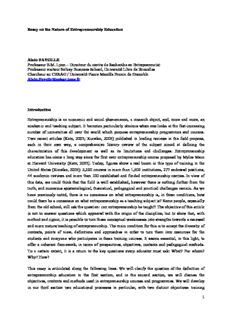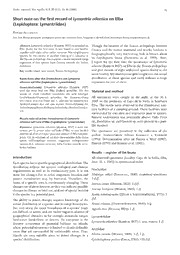
1 Essay on the Nature of Entrepreneurship Education Alain FAYOLLE Professeur EM Lyon PDF
Preview 1 Essay on the Nature of Entrepreneurship Education Alain FAYOLLE Professeur EM Lyon
Essay on the Nature of Entrepreneurship Education Alain FAYOLLE Professeur E.M. Lyon – Directeur du centre de Recherche en Entrepreneuriat Professeur visiteur Solvay Business School, Université Libre de Bruxelles Chercheur au CERAG / Université Pierre Mendès France de Grenoble Alain.Fayolle@esisar.inpg.fr Introduction Entrepreneurship is an economic and social phenomenon, a research object, and, more and more, an academic and teaching subject. It becomes particularly obvious when one looks at the fast-increasing number of universities all over the world which propose entrepreneurship programmes and courses. Two recent articles (Katz, 2003; Kuratko, 2005) published in leading reviews in the field propose, each in their own way, a comprehensive literary review of the subject aimed at defining the characteristics of this development as well as its limitations and challenges. Entrepreneurship education has come a long way since the first ever entrepreneurship course proposed by Myles Mace at Harvard University (Katz, 2003). Today, figures show a real boom in this type of training in the United States (Kuratko, 2005): 2,200 courses in more than 1,600 institutions, 277 endowed positions, 44 academic reviews and more than 100 established and funded entrepreneurship centres. In view of this data, we could think that the field is well established, however there is nothing further from the truth, and numerous epistemological, theoretical, pedagogical and practical challenges remain. As we have previously noted, there is no consensus on what entrepreneurship is, in these conditions, how could there be a consensus on what entrepreneurship as a teaching subject is? Some people, especially from the old school, still ask the question: can entrepreneurship be taught? The objective of this article is not to answer questions which appeared with the origin of the discipline, but to show that, with method and rigour, it is possible to turn these conceptual weaknesses into strengths towards a renewed and more mature teaching of entrepreneurship. The main condition for this is to accept the diversity of contexts, points of view, definitions and approaches in order to turn them into resources for the students and everyone who participates in these training courses. It seems essential, in this light, to offer a coherent framework, in terms of perspectives, objectives, contents and pedagogical methods. To a certain extent, it is a return to the key questions every educator must ask: What? For whom? Why? How? This essay is articulated along the following lines. We will clarify the question of the definition of entrepreneurship education in the first section, and in the second section, we will discuss the objectives, contents and methods used in entrepreneurship courses and programmes. We will develop in our third section two educational processes in particular, with two distinct objectives: training 1 entrepreneurs (or professionals in the field), and preparing entrepreneurial individuals. The first perspective is clearly in line with a professional dimension (how to) whereas the second is concerned with a more spiritual dimension. Entrepreneurship education: a question of definition The definition of entrepreneurship teaching should be contingent on the central object, the concept of entrepreneurship. However, it is not always the case in the variety of points of view, as some link their definitions to political or economic objectives. Moreover, defining what entrepreneurship teaching is obliges one to refine the definition of 'teaching'. We will first clarify this point, then show that the question: 'can entrepreneurship be taught?' is no longer relevant today. We will conclude this section by discussing the various possible definitions of entrepreneurship teaching. Teaching and educating For the vast majority of people, the idea and the concept of entrepreneurship are not clear. The word 'entrepreneurship' is polysemous: it may designate attitudes such as autonomy, creativity, innovation, risk-taking, or the act of venture creation. In this light, training can open people's minds and extend their knowledge. However, is 'teaching' appropriate in all cases? Before clarifying the scope of what entrepreneurship teaching covers, we propose to look thoroughly into the meanings of 'teaching' and 'educating'. We are not sure that the words 'entrepreneurship' and 'teaching', which are often associated, go well together. To check this, we have looked into a few definitions. Teach - To impart knowledge or skill to; to provide knowledge of; instruct in; to condition to a certain action or frame of mind; to cause to learn by example or experience; […]1 Given that entrepreneurship refers to individual initiative, creativity and sometimes innovation, is it possible to favour the emergence of entrepreneurs or make a society more entrepreneurial by giving lessons or "imparting knowledge"? In the definition proposed above, teaching implies a certain passivity of the learner, maybe the word 'educate' would be more appropriate? Educate - To develop the innate capacities of, especially by schooling or instruction; to stimulate or develop the mental or moral growth of; to develop or refine (one's taste or appreciation, for example). […]2 The word 'educate' seems more appropriate, at least for some of the actions in entrepreneurship training. Moreover, this type of education relates to the evolution of learning processes and methods 1 The American Heritage Dictionary of the English Language, 2000, fourth edition, Houghton Mifflin Company. 2 The American Heritage Dictionary of the English Language, 2000, fourth edition, Houghton Mifflin Company. 2 from a didactical mode towards an entrepreneurial mode, as demonstrated by Allan Gibb (1996). Table 1 presents the main differences between both learning modes. Pedagogical methods Didactical model Entrepreneurial model Teaching by the teacher exclusively Mutual learning Passive student, listener Learning by doing Learning through interpersonal exchanges, Learning by reading debates, discussions Learning through feedback from different and Learning through teacher's feedback numerous people Learning in a scheduled and organised Learning in a flexible, informal environment environment Learning without pressure of immediate Learning under pressure: objectives must be objectives reached Others' input is not encouraged Learning by borrowing from others Fear of mistakes and failure Learning through trial and error Learning by taking notes Learning by solving problems Learning through a network of expert teachers Learning through guided discovery Table 1 Didactical and entrepreneurial models of learning (Source: Gibb, 1993.) Teaching and educating have different meanings and do not meet the same objectives. The notion of education seems more appropriate to situations intended for developing learners' minds, raising people's awareness of the entrepreneurial phenomenon, giving them keys to their personal development and professional orientation, and giving them the incentive to act entrepreneurially. The notion of 'teaching' is more appropriate to contexts of knowledge transfer of entrepreneurial themes and dimensions. Both notions of 'teaching' and 'educating' must therefore be combined in entrepreneurship courses and programmes. Opposing these two notions, separating them or favouring one at the expense of the other would no doubt be detrimental to the field. 'Can entrepreneurship be taught?' is no longer a relevant question Surprisingly, some people still argue that it is not possible to teach entrepreneurship. For them, entrepreneurship is a matter of personality, and psychological characteristics. One of the arguments that have been advanced is that talent and temperament cannot be taught (Thompson, 2004). This is true of all professions and professional situations. Nobody will dispute the fact that medicine, law, or engineering can be taught, and yet, there are doctors, lawyers and engineers who are talented and others who are not (Hindle, 2007). A similar reflection can be applied to entrepreneurship and entrepreneurs. There is no doubt that it is possible to educate people in entrepreneurship, however, like 3 in any discipline, it is impossible to tell whether these professionals will be talented or not, just as it is impossible to guarantee a priori the success of a given course of action. The approach that consists in giving the entrepreneur the knowledge to better manage his or her process and overcome difficulties during the preparation and start-up phases of the project, comes very close to teaching, while the approach that leads the entrepreneur to evolve in his or her aptitudes, attitudes and personality is more problematic (Fayolle, 1997). This analysis is confirmed in Peter Drucker's words quoted by Kuratko (2005: 580): "It is becoming clear that entrepreneurship, or certain facets of it, can be taught. Business educators and professionals have evolved beyond the myth that entrepreneurs are born not made.". Defining entrepreneurship teaching Some recent works we have coordinated (Fayolle and Klant, 2006; Fayolle, 2007), with contributions by some leading international specialists on the questions and issues raised by entrepreneurship teaching, propose several definitions and new perspectives to approach the topic. Fayolle (2006) distinguishes three areas of learning related to mindsets (or culture), behaviours, and situations. Hindle (2007) proposes to articulate the definition of entrepreneurship teaching around that of the research object. In this light, if we define the field of entrepreneurship as the "examination of how, by whom, and with what effects, opportunities to create future goods and services are discovered, evaluated and exploited" (Shane and Venkataraman, 2000), then entrepreneurship teaching should be defined as "knowledge transfer of how, by whom, and with what effects, opportunities to create future goods and services are discovered, evaluated and exploited" (Hindle, 2007). This definition echoes the works of some Austrian economists, notably Schumpeter's and Kirzner's, and March's (1991) about the exploration and exploitation dimensions (respectively entrepreneurial and resource management functions), and finally, those of Stevenson and Gumpert (1985). Existing knowledge may as of now be transferred without major difficulties based on this first 'layer' of knowledge, but research based on this definition of the object should produce complementary transferable knowledge. The definitions from the political and economic worlds put forward other dimensions than the research object or teaching domain. They refer particularly to needs and objectives which can be integrated or addressed through teaching and educating initiatives. A recent work conducted by a European group of experts representing all EC member countries proposed a common definition. A consensus was reached regarding the inclusion of two distinct elements: • A broader concept of entrepreneurship education which should include the development of entrepreneurial attitudes and skills as well as personal qualities and should not be directly focused on the creation of new ventures; and • A more specific concept of new venture creation-oriented training (European Commission, 2002). On the basis of this broad definition, it seems relatively simple to establish the political objectives of entrepreneurship education. 4 The variety of definitions comes from both the diversity of approaches within one same frame of reference (academic for instance), and the coexistence of various spheres which all have interests in the field (academic, political and practical). It is nevertheless important that these different spheres learn how to communicate and understand each other better (Bouchikhi, 2003). In the current context, the root of the problem is more the absence of a precise definition of the teaching field than the significant number of existing definitions. As in the words of Lewin: 'There is nothing as practical as a good definition'. Entrepreneurship education : a question of objectives, contents and methods Entrepreneurship education covers a wide variety of audiences, objectives, contents and pedagogical methods. We will not address the variety of audiences here, although it goes without saying that there are significant differences between courses intended for management students or students with a scientific, technical or literary background1. Similarly, teaching entrepreneurship to individuals who are strongly committed to their venture creation project or students who have no intention or no concrete project is very different in nature. In what follows, we will expose and discuss all the diversity of objectives, contents and pedagogical methods which exist in entrepreneurship teaching. We will not present a typology, but recommend the readers who are interested in this type of approach to refer to the works of Jean-Pierre Béchard (2005, 2007), a Canadian researcher who is specialised in both education sciences and entrepreneurship. Benefits and objectives To examine in more detail the benefits and objectives of entrepreneurship training, we are going to start with the various sources which fuel the demand for this type of education. Sources of the demand The increasing demand for entrepreneurship education and training courses has multiple sources. We will deal with the three main sources here. The first one is governmental: economic growth, job creation(s), renewal of the economic fabric, technological and political change, and innovation, in the post-industrial paradigm, depend largely on company and activity creators. Hence an increasing interest for entrepreneurs and such questions as "How and where to foster entrepreneurial vocations? How to educate and train future entrepreneurs?" 1 See for instance Brand et al. (2007). 5 Students represent the second source of demand. Some students wish, in the more or less long term, to create their own company, and others wish to acquire professional skills which are indispensable to their careers in companies of any size. Indeed companies are more and more interested in entrepreneurship and increasingly recruit their young executives among individuals with knowledge, attributes, and sometimes experience, useful to the entrepreneurial act. Small, medium-sized or large companies therefore constitute the third main source. Their executives seem to favour, nowadays, other managerial skills and behaviours than those which prevailed in previous years. Benefits and objectives Benefits and objectives are two facets of one single phenomenon. We will first see what the main benefits are before presenting the fundamental objectives. - Benefits Benefits are linked to the fulfilment of individuals, the improvement of entrepreneurial culture and increasing success rate of entrepreneurial actions and initiatives. Contribution to personal development. Entrepreneurship enables individuals to develop their talents and creativity, to realise their dreams, to acquire more independence, and a certain feeling of freedom. Even if acting entrepreneurially is often difficult (many are called but few are chosen), the venture creation attempt in itself implies a learning process which is useful for the individual's personal development. In this light, entrepreneurship education should aim at developing a taste for entrepreneurship (in its broadest sense) and stimulating a spirit of enterprise (entrepreneurship in a commercial sense, in order to generate profits). Development of countries' entrepreneurial culture. Entrepreneurship is linked to the societal and economic dimensions. Entrepreneurship is not only part of personal development, it is also an engine of economic growth in a market economy. The entrepreneur, as the central element of the entrepreneurial process, is always in search of opportunities to organise and use appropriate resources in order to turn these opportunities into economic or social activities. In so doing, the entrepreneur activates the "destructive creation" process, to borrow Schumpeter's imagery: he or she creates an enterprise which produces innovations, which, in turn, will force existing companies to either adapt or disappear. The various levels of development and economic growth of different countries at a given point in time, or of one single country over different periods of time, are directly linked to the intensity of their entrepreneurial activity at the times. Entrepreneurship education therefore constitutes an essential tool in developing a country's entrepreneurial culture. Beyond the development of an entrepreneurial spirit and taste for 6 entrepreneurship, this form of education can also contribute to improving the image and highlighting the role of the entrepreneur in society. This is all the more important since some countries, as is the case in France, for instance, are not particularly aware of this culture. Increasing the chances of new venture survival and success. Entrepreneurship education can be seen as a means to increase the survival and success rate of newly created companies. It constitutes an excellent way to help people discover what enterprise is, the way it works, to develop a systemic approach, to learn how to think of the company in a more global and less compartmentalised perspective, and finally, to go beyond the common binary point of view of civil servant vs. employee. Entrepreneurship education also entails proposing new career perspectives for part or all of one's professional life. - Objectives As we can notice, expectations and benefits are varied, implying a broad variety of objectives too. We group them into three categories: Raising awareness. Here, the objectives are to make students aware of the possibilities, to help them see in new venture creation a possible career option, and to develop in them positive and favourable attitudes towards entrepreneurial situations. Raising students' awareness may be done in different ways, by emphasising what entrepreneurs bring to our economies and societies for example. Entrepreneurs' motivations, values and attitudes should also be presented and discussed, through testimonies or case studies. Teaching techniques, tools and how to handle situations. Objectives may also be articulated around the transfer and development of knowledge, specific techniques and skills to increase the learners' entrepreneurial potential. In this case the objective is to prepare them to better think, analyse and act as entrepreneurs in specific situations and in various contexts (small and medium-sized businesses). This concerns creation, takeover or intrapreneurship situations. Some of the themes that could be developed cover entry strategies, innovation, creativity or intellectual property. Supporting project bearers. Here the objective is to work with students or participants who are concretely engaged in venture creation projects. Emphasis is more on facilitating individual learning processes, putting individuals in touch with potential partners, gaining access to and acquiring key resources, and finally, coaching. Contents and structuring dimensions Drawing on Hindle's findings (2007) and Johannisson's levels of learning (1991), we distinguish three main dimensions which orient and structure the contents. 7 The professional dimension The professional dimension of entrepreneurship teaching relates more specifically to practical knowledge, or know-how, and secondarily to that of theoretical knowledge. Concretely, this dimension relies on three kinds of knowledge: - Know-what: what one has to do to decide and act in any given situation. For example, what one must do to create a technological company, to validate an opportunity, to conduct a market study, etc. - Know-how: how to deal with any given situation. For example, how to check the adequacy between a given project and one's personal profile, taking into account accumulated experience, how to identify the risks, how to deal with them, etc. - Know-who: who are the useful people and which are the useful networks depending on the situation. For example, being able to identify the generic actors of new venture creation in the sector of biotechnologies, locating those who may be interested in / concerned by the project, identifying venture capital agencies and business angels who could be interested in a given project, etc. The theoretical dimension This dimension deals with knowledge in its broad sense. The contents taught concern the effects and impacts of entrepreneurship, or any other question related to the phenomenon and process. The spiritual dimension This last dimension refers to knowing 'how to be'. Contents focus mainly on two aspects: - Know-why: what determines human behaviour and actions, entrepreneurs' attitudes, values and motivation. What makes entrepreneurs who are ordinary human beings do what they do. Testimonies of entrepreneurs in various situations with varying degrees of performance may, along with debates with teachers and feedback, constitute appropriate and interesting modes of learning for this type of content. - Know-when: when is the right time to go ahead? What is the best situation according to my profile? Is it a good project for me? These are some of the key questions students are confronted with. Case studies, interviews with experts and professionals generally constitute good ways to address these points. To conclude on this final dimension, we would like to underline the fact that successful teaching in entrepreneurship should enable individuals to position themselves in space and time as regards the entrepreneurial phenomenon. Positioning oneself in space consists in identifying the entrepreneurial 8 situation(s) which are consistent with one's profile. Positioning oneself in time implies recognising the moments in one's life when it is both possible and desirable to commit to an entrepreneurial project. Pedagogical methods They make up the 'how' of pedagogical issues, which follows the 'why' (objectives) and 'what' (contents). Although some teachers tend to overemphasise it, pedagogy is not an end in itself. Pedagogy is meant to serve the objectives. As soon as objectives have been set and specific constraints have been identified, methods can be selected. In the field of entrepreneurship teaching, there is a wide range of pedagogical methods, approaches and modalities (Carrier, 2007; Hindle, 2007). We will give a quick overview of some of them below, as an illustration: - elaboration or evaluation of business plans by students, - development of a new venture creation project, - guidance of young entrepreneurs through support missions to help them in their project, - interviews with entrepreneurs, - computer simulations, - videos and films, - behavioural simulations, - traditional lectures, There is no universal pedagogical recipe to teach entrepreneurship. The choice of techniques and modalities depends mainly on the objectives, contents and constraints imposed by the institutional context. 'Learning by doing', which is often praised by teachers in the field, is well suited to some pedagogical situations, while it may be particularly inappropriate in others. The watchword here is to be cautious, and all the more so as little research has been conducted on the assessment of entrepreneurship teaching (Fayolle, 2005). It remains to be proved that one pedagogical approach is better than another, which provides interesting challenges for the next few years. Entrepreneurship education: a question of learning processes Learning to be entrepreneurial is a matter of learning processes. We have presented the objectives, contents and dimensions of these processes; we will now develop two processes in particular which we deem essential for our field of interest. The first process focuses on how to become an entrepreneur. It is intended for people engaged in an entrepreneurial project who wish to benefit from some support and training. There are numerous programmes of this kind throughout the world. They emphasise the professional dimension, and the core pedagogy is 'learning by doing'. The objective is to train entrepreneurs by guiding them throughout their project's development. The second process is 9 aimed at helping individuals position themselves as regards entrepreneurship and become more enterprising. In this case, the spiritual dimension is put forward and there is a wider range of pedagogical methods used. Using entrepreneurs' testimonies can also be key in reaching the objectives, thanks mainly to the role models they can represent. The learning process to becoming an entrepreneur This learning process must take into account contexts or situations in which entrepreneurs operate. In this process, learning is accomplished in an emergency mode and constrained by the situation and previous experience. This learning produces very personal conceptions of the future management style and role. The characteristics of this type of learning in the field must be fully understood and training programmes must be adapted and tailored according to these specific needs. The idea that, in venture creation training, real-life situations and learning methods directly in the field should be preferred is not new. 'Learning by doing' and other inputs by Gibb (1993 and 1996) constitute an interesting conceptual basis in this regard. However, the type of learning in question here is real-time learning, in a real situation, with high economic and personal stakes. Learning is made necessary by the number of incidents, events and problems that occur in the first few years of the company's life. It happens at an individual level and concerns the key actors (the entrepreneur and members of the team), but it also happens at a collective or organisational level1. The actors' learning is an indispensable reaction to the new venture's dynamic of change and is a central element of success (or failure) in start-up situations, as Bruyat underlines it (1993: 352): Considering learning as one of the key factors of success of a new venture creation is seldom taken into account by researchers. There seem to be two reasons for this. The first one relates to the ideological and paradigmatic foundations of entrepreneurship: considering that entrepreneurs need to learn challenges the assumption that acting entrepreneurially and succeeding are entirely determined by the initial conditions, hence that entrepreneurs possess, right from the start, particular characteristics. The second one relates to the fact that, most of the time, researchers study entrepreneurs who created their company several years before, and so the learning has already been done. The entrepreneur's learning could therefore consist in finding increasingly quickly and appropriately, satisfactory answers to the diversity of problems encountered. Insisting on the individual dimension of learning while including the complementary and structuring collective dimension parallels with Bouchikhi's vision (1991). He identified, while working on managers' biographies, several common characteristics in company management learning processes. We present them below and adapt them to the context of entrepreneurial learning. 1 See for instance the works on collective learning in the sector of innovative technology venture creations, by V. de La Ville (1996 et 2000). 10
Description:The list of books you might like

Mind Management, Not Time Management

The Silent Patient

The 48 Laws of Power

$100m Offers

The Coin Dealer Newsletter Monthly Supplement Newsletter: 2006

Eczema Free in 30 Days

The Sapphire Cross by George Manville Fenn

On Cambrian and Cumbrian Hills: Pilgrimages to Snowdon and Scafell by Henry S. Salt

c 2009 by Kyoungsoo Park

C anton (©bsferVitr

C anton O bsierber

C anton €>bserUer Supporters to lobby for airport purchase

Short note on the first record of Lymantria atlantica on Elba

C anton €>bSerUer Board OKs 3 officer spots; new dispatch

NASA Technical Reports Server (NTRS) 20080006487: An Intercomparison of Microphysical Retrieval Algorithms for Upper Tropospheric Ice Clouds

Tafseer-e-Siddiqi (Volume 27)

Greek Government Gazette: Part 4, 2006 no. 343

Greek Government Gazette: Part 4, 2006 no. 500

Greek Government Gazette: Part 4, 2006 no. 431

Greek Government Gazette: Part 2, 2006 no. 1768




